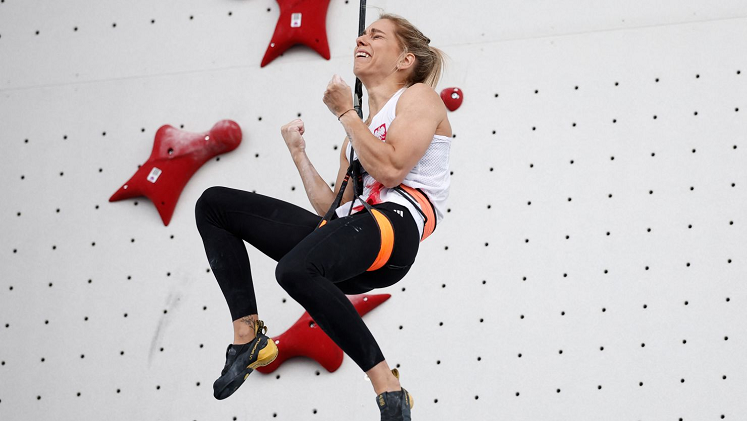Speed climbing at the Olympics stands out as a high‑octane spectacle. Athletes ascend a standardized 15‑meter wall faster than their opponents, often in under six seconds for elite competitors. This discipline challenges climbers’ explosive power, technical precision, and nerves of steel. In this comprehensive guide, we’ll explore everything you need to know about Speed Climbing Olympics.
What Is Speed Climbing Olympics?
Speed Climbing Olympics is one of the three sport‑climbing disciplines recognized at the Olympics (alongside lead and bouldering). Unlike lead and bouldering—where routes differ—speed climbers race identical, fixed routes, allowing for direct time comparisons across competitions.
Competition Format & Rules
Head-to-head elimination: Climbers compete in one-on-one races.
False start disqualifies climber.
Bracketed format: qualification → quarterfinal → semifinal → final and bronze medal match.
Timing: Runs are timed electronically—first to hit the buzzer wins.
This head‑to‑head structure builds drama, though critics argue it sidelines pure time‑trial results .
Equipment & Climbing Wall
Wall: 15 m tall, 95° overhanging, with identical holds on both lanes.
Auto-belays ensure safety, retracting rope to catch climbers if they fall.
Gear includes climbing shoes, chalk, and sometimes protective taping due to high‐impact repetition.
Evolution Since Tokyo 2020
Tokyo 2020 marked the Olympic debut of sport climbing, combining speed, bouldering, and lead into one “combined” event .
In Paris 2024, the format changed—speed was awarded its own medals, and bouldering/lead stayed combined.
World & Olympic Records
| Event | Record Time | Athlete | Date & Event |
|---|---|---|---|
| Men’s Olympic record (Tokyo) | 5.45 s | Bassa Mawem | 3 Aug 2021 |
| Women’s Olympic record (Tokyo Final) | 6.84 s | Aleksandra Mirosław | 6 Aug 2021 |
| Men’s World Record (Paris Bronze) | 4.74 s | Sam Watson | 8 Aug 2024 |
| Women’s World Record (Paris Qualifiers) | 6.06 s | Aleksandra Mirosław | 5 Aug 2024 |
| Most recent men’s WR | 4.64 s | Sam Watson | May 2025, World Cup Bali |
Top Athletes to Know
Sam Watson

Sam Watson (USA): Born 2006; bronze at Paris, WR at 4.74s, then 4.64s in Bali, 2025
Veddriq Leonardo (Indonesia): Gold medalist in Paris, 4.75s
Aleksandra Mirosław (Poland): World champion, current women’s WR holder
Bassa and Mickael Mawem (France): Bassa set initial Olympic record in Tokyo (5.45s)
Techniques & Training
Precision: Every hold and movement is replicated perfectly to shave tenths.
Speed mechanics: Techniques like the Tomoa skip shave hold time
Repetition: Athletes train tens of thousands of runs—U.S. climber Piper Kelly reportedly performed the route ~30,000 times.
Strength training: Focus on explosive, finger, and forearm power.
Challenges & Risks
Injuries: Frequent finger splits, ripped skin, ligament strains—extreme repetitive motion causes wear.
Technical glitches: Faulty timing pads can delay races, as seen in Paris qualifiers.
Pressure: One slip or false start can eliminate even world‑class athletes.
Speed Climbing vs. Other Climbing Disciplines
Bouldering: Short, unroped routes; mental puzzles, not races.
Lead: Long climbs with ropes—focus on endurance and route-reading.
Speed: Purely about ascent time; explosive power and memorization.
Experts argue this discipline requires near‑opposite skill sets from the other two, leading to speed specialists dominating.
Road to Paris 2024 & Beyond
Paris 2024 solidified speed climbing’s independent status, awarding separate medals and boosting visibility. With the world record now at 4.64s, attention will shift to whether athletes can break the 4.5‑second barrier by LA 2028.
(FAQ) About Speed Climbing Olympics
Q1: What is the standard speed-climbing wall height?
It’s a 15‑meter, overhanging wall with a 95° angle, featuring identical routes on both lanes
Q2: How is Speed Climbing Olympics scored?
Climbers race head‑to‑head. The first to reach the top wins that heat, advancing via elimination rounds. Records are measured by individual time.
Q3: Why isn’t the format just fastest time wins?
The head-to-head bracket format amps up competition tension, but has drawn criticism for potentially eliminating the fastest climber early due to seeding .
Q4: Who holds the current world records?
Men: Sam Watson – 4.64 s (May 2025, Bali).
Women: Aleksandra Mirosław – 6.06 s (Paris 2024)
Q5: How does risk factor into speed climbing?
Extreme repetition leads to finger and ligament injuries. Protective measures like taping or even superglue on nails are common .
Q6: Will speed climbing change in future Olympics?
It’s poised to stay independent after Paris. The focus is now on lowering records and expanding global participation—attention now shifts to LA 2028.
Conclusion: Speed Climbing Olympics
Speed Climbing Olympics has sprinted from obscurity to Olympic glory in just a few years. With its own medal event in 2024 and rapidly lowering record times, it’s poised to be one of the most electrifying track‑style sports of the Games. From the technical precision of the Tomoa skip to the explosive power of world‑record runs under 4.7 seconds, speed climbing continues to capture fans worldwide.



